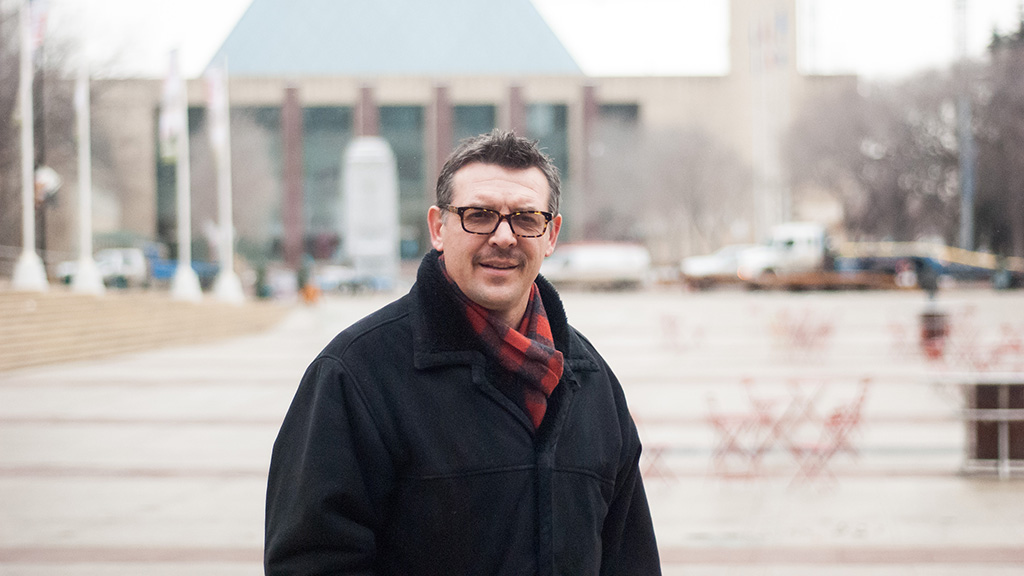Theo Fleury’s new book chronicles his rise from a traumatic childhood
 Richard Catangay-Liew
Richard Catangay-LiewAfter being molested as a teenager, Theo Fleury didn’t sleep for 27 years.
Every time the former NHL superstar closed his eyes, all he could see was the dark room in which it happened. For years, drugs and alcohol lulled him to sleep as he tried in vain to deal with the trauma that lingered from his formative years.
Now, the 46-year-old can rest his head on his pillow at night after watching some TV, turn off the lights and enjoy a restful sleep — completely sober for more than 3000 days.
It wasn’t until he learned to ask for help that his life began to change for the better.
“It wasn’t until I reached out my hand for help that somebody was there to grab on to it and help me,” he said. “That’s where I made the greatest strides of my life, realizing that I need people and that I need to have relationships or that I need to connect with people. I cant live inside of this. I need to talk about what’s going on inside.”
Fleury’s journey to come to terms with a traumatic childhood and skyrocketing hockey career are unearthed in his new book, Conversations With a Rattlesnake.
The hockey legend’s lengthy NHL career saw him accumulate more than 1000 points, win a Stanley Cup and an Olympic Gold medal for Team Canada. But it also led to a rocky battle with drug and alcohol addiction. The novel chronicles two years of conversations between Fleury and his therapist, Kim Barthel, revealing deep personal insights about his struggle with trauma and sexual abuse.
“(My first book), Playing With Fire laid it all out there, talking about my life, what had happened, how it effected me,” Fleury said. “Having read a lot of self help books myself, I was looking to write a self help book.”
The key for Fleury was finding the right person to write it with, he said. He first met Barthel at a conference in Winnipeg, where they were both keynote speakers. After listening to her presentation, he knew the two of them were going to be working together for a long time.
“I got there early and sat in on Kim’s keynote and was completely blown away at the information she was providing,” he said. “After she was done I went up to her and I said, ‘you just changed my life, and I think you’ll be working with me for the rest of yours.’”
Through his conversations with Barthel, Fleury was able to realize that his issues were the result of the environment in which he grew up — something he couldn’t control.
“From there, that’s when I really started to heal,” Fleury said.
Had he never sat down, opened up and dug through the layers of his life story with Barthel, he never would have discovered that his brain has a dopamine deficiency — a result of his mother using anti-depressants when he was in the womb.
As a child growing up in a broken home with parents suffering from addiction, there’s no way Fleury would have been able figure this out on his own, so playing hockey kept him on track, he said.
“I honestly don’t think I would be alive if I didn’t have hockey,” he said. “It was that one place, that one outlet that everything I wasn’t getting at home, I went to the rink and I got it — admiration, love, respect, all those things. If it wasn’t for hockey, I don’t know what the hell would have happened to me.
“When I was at the rink, everything was fine. It was when I left the rink that I had my biggest problems.
When Fleury was on the ice, he experienced a rush of pleasure-inducing dopamine, but when he wasn’t, the easiest way for him to get the brain’s necessary neurotransmitters was through snorting cocaine.
“Most people who do cocaine are tweakers, he said. “They’re biting their face off, they’re talking 500 miles per hour. That wasn’t my experience. It leveled me right off.
“Now that I’m in this healing world, I ran into this naturopath doctor who gave me a pure dopamine pill, and I feel amazing. I would have never discovered that if I didn’t run into Kim and we didn’t go through the layers of my story and find out I need dopamine. Now that I have dopamine, I feel great.”
Although he knows that his NHL stardom has given him a powerful voice to advocate for mental health, trauma and abuse, Fleury hopes one day he’ll be known as a spiritual healer who used to play hockey.
“I’m a big picture guy. I know that I played in the NHL, but I don’t play in the NHL anymore,” he said. “As an advocate for mental health, an advocate for child sexual abuse, an advocate for change, I have to look at the bigger picture.
“As a society, we need to change how we view this subject,” he said. “If we’re going to stop the cycle, we need to fully understand what’s involved and what the solution is as opposed to pointing fingers.”
Fleury said the purpose of the book is to help other people realize that having conversations and being open about their problems isn’t a sign of weakness — it’s a sign of strength, he said.
“Its OK to talk and its OK to ask for help,” he said. “It doesn’t mean you’re weak. It means the complete opposite. That you have courage and that you have strength and that you actually give a shit about yourself.”




